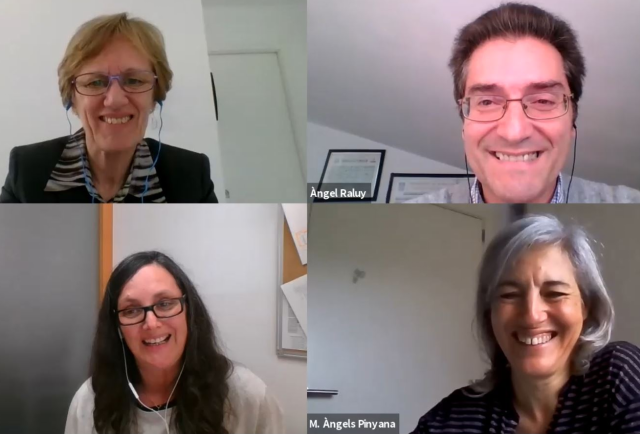
The organisers
It was way out of our comfort zone but we got through our first online symposium on 4th and 5th March with relatively few hiccoughs. I am a member of the organising committee so hardly impartial, but it was great (even though it was online), it was refreshing and we didn’t make complete fools of ourselves with the tech!
We heard multiple perspectives on internationalisation and intercultural communication, which opened our eyes to the realities of 21st century higher education. Panelists included educators and researchers, university students and staff, together with practising professionals, who participated in the three main symposium themes:
- Quality and internationalisation
- Teaching and learning intercultural, global and professional competencies
- Best teaching practice
Dr Patrick Studer, Zurich University of Applied Sciences, gave an inspiring keynote speech, alerting us to the challenges of internationalisation in society (macro level), in higher education (meso level) and in the classroom (micro level). This all-encompassing introduction provided an excellent backdrop for the ensuing symposium talks, with several panellists referring back to Dr Studer’s framework throughout the symposium.
Marina Casals (URV) and Joan Masnou discussed institutional strategies, both emphasising that successful internationalisation means giving everyone opportunities for training and inclusion in the internationalisation process. Guzman Mancho-Barés (UdL) and David Block (UPF) focused on internationalisation in the university classroom and presented their qualitative study on the use of oral presentation rubrics, not by language teachers but by engineering lecturers using English-Medium Instruction (EMI).
The second block of the symposium turned to online initiatives, beginning with Luana Ferreira (Deusto) and a task-sequencing approach to supporting students in developing intercultural competence online. She was followed by Sharon Williams (Coventry), Joan Bertan, Niina Valtaranta (Häme University of Applied Sciences,) and Charleen Chen, who showcased collaborative online international learning (COIL) projects in Biomolecular Analysis and Engineering. Students reported benefits in all of these projects, despite some challenges for themselves and the teachers. Francisco Javier Montiel brought the fuzziness of intercultural competence into the discussion, compelling us to think carefully about diversity, how it has been handled over the years and evaluating the success of different types of practices. The day ended with a round table hosted by Àngels Pinyana with Montse Bosch, of Vic City Council, Naroa Castro, a trainee teacher, and Adriana Panadès, a strategic account manager, who gave lively examples of intercultural incidents from their everyday lives, bringing home the importance of intercultural training and implementation, which according to Javier Montiel, still falls short in addressing diversity in today’s society.
Best teaching practices for intercultural competencies were outlined by Anna Gómez-Mundó and Caterina Sugranyes (URL). Anna discussed the value of an intercultural, social approach in teaching the local language, Catalan, to migrants in Vic, and Caterina presented EUDOIT, an online multilingual tool for helping learners rapidly gain an A1 level in a new language by building on their existing language knowledge. Both presentations argued for learner-driven teaching and learning processes and taking socio-cultural and sociolinguistic backgrounds into consideration for positive gains in academic achievement. Marta Fernández-Villanueva (UB) and Marta Panadès (UB) discussed the use of scenarios for intercultural training and the symposium was wrapped up by Lucrecia Keim, Àngel Raluy, Àngels Pinyana and myself, with a presentation on the status of intercultural training at UVic. We concluded that we need to keep a critical eye on internationalisation processes in higher education, push for more intercultural training across disciplines, not only for better employability but also as a key life skill, and promote online international projects for more inclusion, sustainability and development of soft skills.
So, newbies we are no longer. We are truly initiated into the world of virtual events, we being Lucrecia Keim, chief organiser and inspiration for the symposium, Joan Masnou, Àngels Pinyana, Àngel Raluy, Gemma Delgar, Marta Brugera. Thanks too to the UVic University Teaching and Educational Technology Unit (UDUTE). We got some positive feedback from participants, which always gives the ego a little boost and starts you thinking about what the next project will be or whether to publish. So watch this space!
If you are interested in any of the topics we covered at the symposium and would like to know more, please contact lucrecia.keim@uvic.cat.








